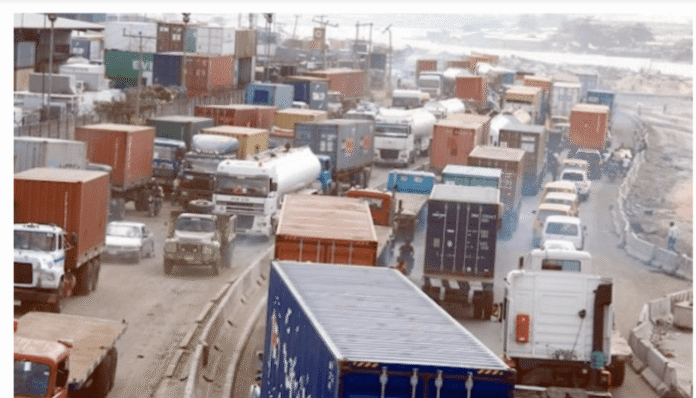The National Association of Road Transport Owners (NARTO) and the Maritime Workers Union of Nigeria (MWUN) have rejected the Lagos State Government’s introduction of a N12,500 levy on trucks accessing the Lekki Deep Seaport under the E-Call-Up system.
A statement by MWUN’s Head of Media, Mr. John Kennedy Ikemefuna, revealed that the levy is being enforced by the Lagos State Ministry of Transportation as part of efforts to regulate truck movement through an electronic call-up system at the port.
It said the implementation of the E-Call Up system—and the associated N12,500 charge—officially resumed on June 16, 2025, after an initial rollout in September 2024 was suspended in March 2025 following resistance from stakeholders.
According to the statement, “The National Road Transport Owners (NARTO) and Maritime Workers Union of Nigeria (MWUN) have frowned over the implemented E-Call Up system levy of N12, 500 per truck.”
Ikemefuna said the N12,500 levy was collected at the Lekki Deep Blue Seaport by the Lagos State Ministry of Transportation,” the NAN report read in part.
The statement further revealed that NARTO had previously written to the Ministry to oppose the levy, citing the rising cost of petroleum products and the broader economic hardship facing operators.
He described the decision to impose the charge without prior stakeholder consultation as poorly timed and warned that it could further strain the finances of transporters.
The unions emphasised that while they support structured regulation and traffic control via the E-Call Up system, the financial impact of the N12,500 levy demands urgent review.
The unions, however, urged the Lagos State Government to initiate meaningful engagement with transport stakeholders to arrive at a fair and practical solution.
In a similar development, the Independent Petroleum Marketers Association of Nigeria (IPMAN), South West Zone, had earlier instructed its members to boycott the Lekki corridor in protest against the same charge, warning that it could disrupt fuel logistics and supply across the region.
IPMAN said that the Lekki-Epe corridor, home to key infrastructure like the Lekki Deep Sea Port, Dangote Refinery, and major industrial estates, has seen a surge in truck traffic and worsening congestion.
It said, “Although enforcement is just beginning in this axis, the E-Call-up system was first launched by the Nigerian Ports Authority (NPA) in 2021 for Apapa and Tin Can ports.
“The Lagos State Government extended it to the Lekki corridor in September 2024 but paused enforcement in March 2025 after stakeholder consultations. Its implementation resumed on the corridor on Monday, June 16, 2025.
“Under the revised system, operators must upload their Authority to Load (ATL) documents and book parking slots before gaining access. To support this, Lagos approved seven truck parks along the corridor, equipped with restrooms, kitchens, and electricity to improve driver welfare.”
The Independent Petroleum Marketers Association of Nigeria (IPMAN) has urged the Lagos State government to reduce the electronic call-up parking fee from N12,500 to N2,500.
IPMAN’s National Publicity Secretary, Mr. Chinedu Ukadike, in an interview with newsmen on Tuesday, urged the Lagos State government to reduce the electronic call-up parking fee from N12,500 to N2,500.
Ukadike stated the appeal is necessary to avert a potential rise in the price of petroleum at the pump.
Recall that the Lagos government, via the Electronic Call-up Systems Company, recently raised the truck parking fee from N2,500 to N12,500. This decision triggered a protest on Monday, during which truck drivers’ suspended operations, affecting deliveries from Dangote Refinery and Lekki Deep Seaport.
He said stakeholders at a recent meeting unanimously agreed that the parking fee should return to N2,500, calling the current rate excessive. “The imposed amount is exorbitant and unbearable for marketers. It will inevitably lead to an increase in the pump price of petrol,” Ukadike said.
Ukadike emphasised that the aim of their actions is to ensure stable energy supply and security nationwide.

